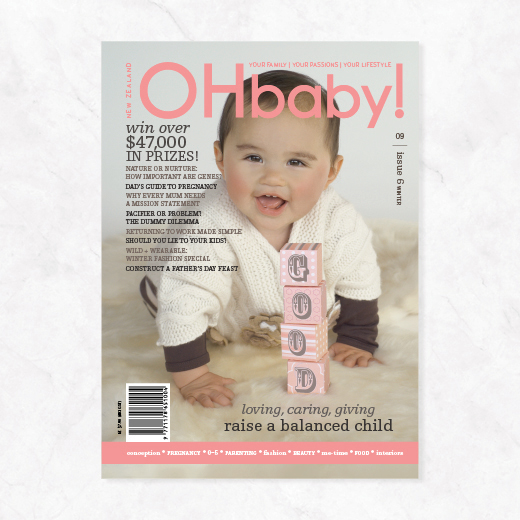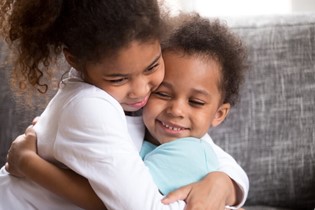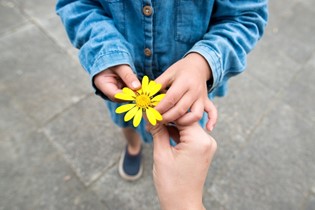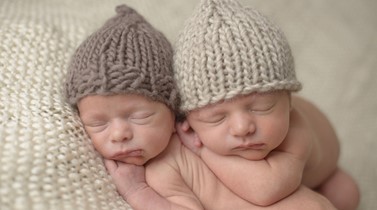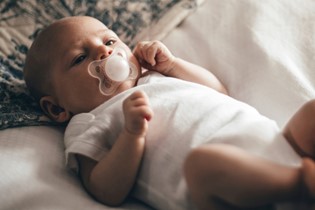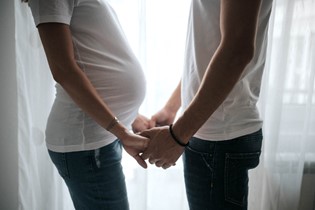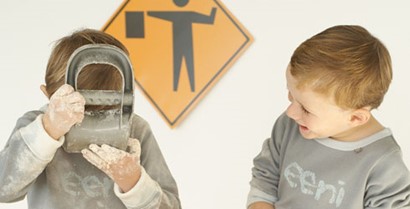Just how honest should you be with your children?

Santa, the Easter Bunny and the Tooth Fairy are childhood institutions - but are we right in letting our children believe in them, or are we setting them up for a fall? Here, two mums explain their opposing viewpoints on just how honest we should be with our kids.
THE WHOLE TRUTH
by Liz Breslin
Do you promise to tell the truth, the whole truth, and nothing but the truth? It's a big call. The truth - the whole truth? Maybe there's no such thing. But we owe it to our kids to be open with them.
"Where did I come from?" "How did I get there?" "How did I get out?" "Have you ever been arrested?" "Does Daddy smoke?" "Why does Daddy smoke?" "Where do you go when you're dead?" How do you answer questions like these? With the truth, in language the kids can understand.
First, we have to be clear about what the truth is. What I mean is that we should give our children the honest facts. Kids are smart. If they know they are being given the facts, they will learn to trust their own instincts, trust us, and turn to us. I know that's the kind of relationship I want with my kids as they grow older and have questions about things like drugs and sex.
Why would you lie to your kids? For convenience? To save their innocence? Because everyone else does? Not good enough. Take the Easter Bunny. Actually, take him far, far away. Unless you worship the god of rampant commercialism, there's no point at all in perpetuating that particular lie.
My children live mostly in their own worlds, playing teachers, pilots, and Antarctic explorers. I'm all for allowing them to explore their own fantasy lives (let's face it, some adults inhabit them too!), but they should understand how lucky they are that they just play at danger. A while back, while tanks were rolling into Georgia and shredding people's lives, my son was into army games. He pretended to shoot his sister, and I cried. They asked why. So I explained about the war in simple terms that they could understand. Not to scare them. Just to tell them. It's important for kids to know such truths - guns kill, people die, and we are fortunate to live where and how we do.
"If we perpetuate the fluffy view of real life, we are patronising our kids and conspiring to ignore harsh truths."
If we perpetuate the fluffy view of real life, we are patronising our kids and conspiring to ignore harsh truths. Everyone dies. If we were more up front about this with kids, maybe they'd grow up to be adults with fewer issues than us.
The same goes for sex. Making the connection between storks, special kisses, and crying bundles has to be more difficult than hearing about eggs, seeds and wombs. After all, the facts of life and death are just that - facts.
I know a lovely old granny who was lied to about her dad's death. She was told he had gone away for a long time. Was this kind and convenient in the short-term? No, she never believed it. She spent her childhood wondering what other lies she'd been told. She's still not sure. Kids are both too young and too smart to cope with obscure euphemisms.
When Uncle Jim died, we talked about why Dad was sad and what being dead means. It's good to let our children know about our emotions and how we handle them. It's honest and true, and will help them to deal with their feelings honestly and truthfully. One of the kids' kindy teachers told them that Uncle Jim had gone to heaven. This is her reality, not ours. Or, to put it another way, there's a difference between the truth, my truth, and an actual fact. The only way I could reconcile this was to tell the kids that some people believe that when you die you go to heaven, and some people don't. The fact is, we don't know. You have to decide for yourself what to believe.
We took, and continue to take, the same "some people" approach to the controversial Santa Claus question. We've told the kids that some people believe that Christmas is about baby Jesus being born (my daughter has a girl doll she calls "Jesus" because she got him - sorry, her - for Christmas); some people believe in Tomte, the Christmas elf; some people believe in Santa. Oh, and some people don't even celebrate Christmas. The kids decided on Santa for now, so I even help them put out whiskey for him (and drink it later myself, ha ha). But they know that I don't believe in him, and so they reckon it serves me right when I don't have any presents on the end of my bed.
To me, Santa is in the same category as fantasy hunting trips and fairy tea parties - on that fine line where truth, belief, and fantasy intersect in childhood. For the moment, these are their truths. And our job as parents is to talk as honestly, fairly, and impartially as possible to our kids and to encourage them in building up their own truths. This will prepare them far better for the wider world than a pack of pointless lies.
Liz Breslin is a freelance writer based in Hawea Flat, New Zealand. Her short stories, poetry, and articles, including a series of opinion pieces called "Mum's the Word", have been published in New Zealand and abroad.
BLISSFUL IGNORANCE
by Laura Williamson
"Mum, am I going to die?" "How does Santa fit down the chimney?" "Did I hatch out of an egg?" Death, Santa, and sex: It's the Bermuda Triangle of parenting. And as far as I'm concerned, you should stay out of it as long as you can. Sure, honesty has its place, but when it comes to telling our children about real life, truth is a dish best served sparingly.
I didn't always feel this way. Before I became a parent, I thought that honesty was surely the way to go. All children are doomed to confront life's realities eventually, I reasoned, and it is up to adults to prepare them for this. Telling them the truth about Grandpa Mike's bout of prostate cancer, and that the Easter Bunny is a corporate creation designed to boost chocolate sales, is the only way to protect them from future shock and disappointment, right?
Then I had a child of my own, and my opinion changed. For one, I started to understand how precious the world of childhood is, and that one of the things that makes their world precious is blissful ignorance.
Take last Saturday. My son, who is almost four, did the following things, all before lunchtime: Played with the set of marbles Santa brought him, put on his red superhero cape and chased the baddies out from behind our fridge, painted a love-heart for a girl in his daycare class, and destroyed the imaginary town in his sandpit with an avalanche.
What a wonderful world he lives in. It's a place populated by superheroes, where love lasts for always, where a village fattened by a mudslide can be rebuilt in minutes with a plastic spade, and in which a perpetually jolly man flies around the planet one night every year to bring gifts to all of Earth's children. It's a world I once lived in. It's a world I'd love to have back. So why would I take it from my son before I have to?
I recently read an article on the MSNBC Health website reassuring parents that letting their children believe in Santa Claus would not psychologically harm them. It seems there's a lot of worry out there that once the Santa lie is uncovered, the parent-child bond will be forever tainted by mistrust. Nonsense. The Santa story, like many childhood myths and fables, teaches our kids about hope, joy, and kindness. The character of Santa sprinkles important life lessons with a bit of magic - believing in him is both a learning experience and a whole lot of fun.
Of course, from a practical parenting point of view, the naughty/nice, coal-in-the-stocking threat can also come in quite handy, particularly when a fork-wielding preschooler is eyeing up a nearby electrical socket. And what better way to dry the tears from a sore incisor than the promise of a gold coin from the Tooth Fairy? (I'm not actually sure what the point of the Easter Bunny is, but I do know that a world in which a big, fuzzy pink rabbit leaves you chocolate in the night is better than a world in which one doesn't.)
"How should you answer the trickier questions? I weigh up honesty versus kindness and always make sure that kindness wins out."
Fibbing about supernatural beings is one thing, but how should you answer the trickier questions? I weigh up honesty versus kindness and always make sure that kindness wins out. A young boy doesn't need to know that he, and everyone he loves, is going to die. If he must be told, I would argue that it should be made to seem so impossibly far away so as to be unreal: "Not for a very long time, sweetie."
As for sex, a vague reference to "cuddling" and babies growing in mummies' tummies is usually enough to defect further inquiries. Sure, young children are curious, but I'm not convinced that they really want to know what adults get up to after dark, and I don't see the purpose in telling them. Frolicking naked in public is another of childhood's sweet privileges; why muck it up by making children self-conscious about their bodies - not to mention running the risk of them explaining the whole thing in graphic detail to the other kids on the beach?
My son will discover soon enough that death can be painful, and that it sometimes takes away the people we love for no good reason. He'll learn about heartbreak and about the maddening unfairness of poverty, war, and natural disasters. He'll find out that magical beings don't come by in the night just to make us feel better.
For now, though, I'm keeping things on a need-to-know basis. Children are not adults, and they don't need to be told everything about the adult world. They'll learn the truth all too quickly. Why not keep them in the dark for just a little bit longer?
Laura Williamson is a Wanaka-based freelance writer and editor who has been published in newspapers here and abroad over the last fifteen years. Her work has appeared in Brain, Child magazine, Spoke, a New Zealand cycling publication, QT Magazine and has written for the Otago Daily Times.

AS FEATURED IN ISSUE 6 OF OHbaby! MAGAZINE. CHECK OUT OTHER ARTICLES IN THIS ISSUE BELOW
